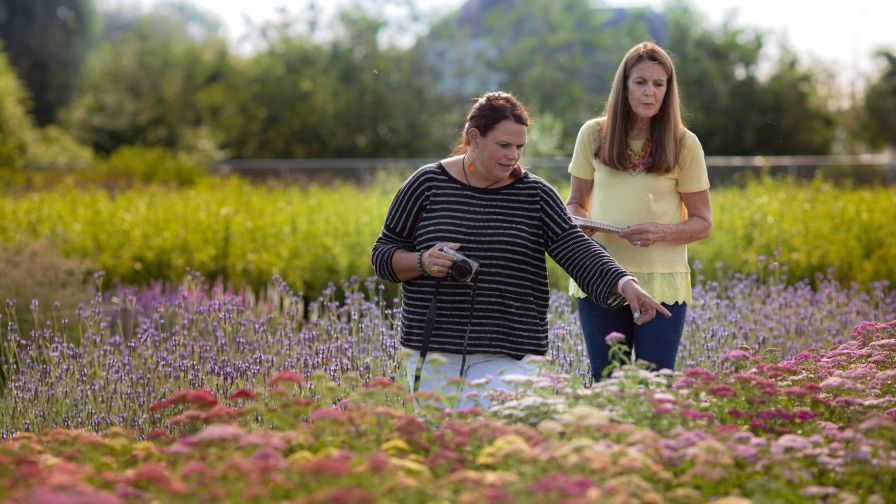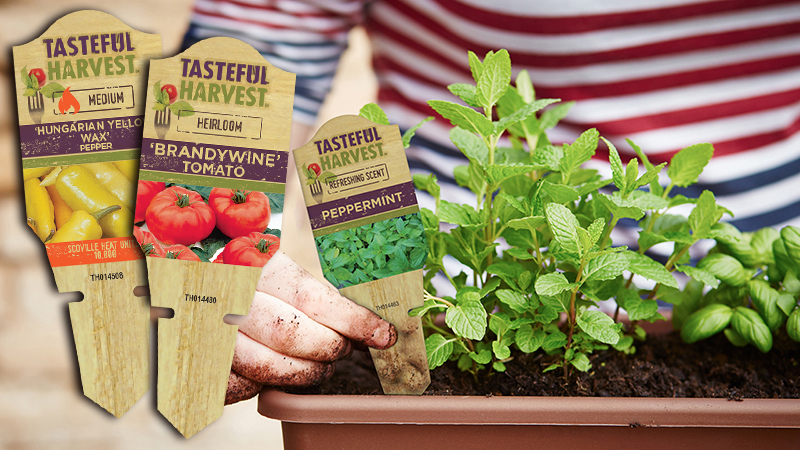Plant Trials Benefit Breeders, Growers Alike

Angela Treadwell-Palmer, left, and Linda Guy of Plants Nouveau walk through their trial gardens in the Netherlands. Photo: Plants Nouveau
Two varieties of Salvia at California Spring Trials (CAST) may have taken quite different paths to get there, and getting there means they were the best of the best. Thousands of plants don’t make the cut for reasons from marketing to just being fussy to grow.
We caught up with some folks to discuss the process and how breeders work with growers to test new varieties. The methods vary, and the organizations range from boutiques to nonprofits to market movers, but the ending of the story is the same: it has to be a good plant.
Once the breeders have waved their magic wands and created something new and potentially interesting, the process begins. Just because a Calibrachoa can handle neutral pH doesn’t mean it’s ready for prime time. Trials will verify the plant’s staying power. Does it propagate easily, and does it keep good form?
“First and foremost, we’re looking for something that is disease-resistant. That’s big,” says Georgia Clay, Plant Selections Manager at Monrovia. They’re looking for plants that will perform not only for nursery growers but also for gardeners at home. She lists other evaluated attributes in trials: a compact habit, reblooming, larger or more interesting flowers, or unique colors. “Foliage color is something that we’re honing in on now, especially dark foliage.”
Trials let the growers and stock plant producers put the plant through its paces. Delilah Onofrey, Marketing Director for Suntory Flowers, explains what she’s looking for in a successful trial. “Can it replicate true to its parent plant? Will it hold up in summer temperatures?” Suntory is also looking at how long it takes to get flowers and if it will root and branch well. A plant that branches well doesn’t need to be pinched as much and better fills out the container.
To do a proper trial requires numbers. The breeder may only have a few plants, or even just one. Brent Horvath is the president of Intrinsic Perennial Gardens. As a breeder and a grower, he’s vertically integrated, but still sends new varieties out for trials.
“As a propagator-grower, I’m growing out a lot of seedlings every year. From those seedlings, I make selections based on better foliage, flower color, or disease resistance the first year. The second year we might propagate 10 to 50 and take it through the typical production cycle,” he explains.
Feedback and Early Access — Something for Everyone
Any partnership must be mutually beneficial, whether it’s Rhizobium and roots or breeders and growers. For the breeders, benefits include insight, feedback, and exposure.
“One of the growers we work with on research and development is Metrolina, who also does consumer research. Last season we had them ask questions to the public (about specific varieties) through a third party,” says Onofrey. It’s valuable information that breeders have a hard time getting themselves.
So, do trial growers ever say this is great, but can you fix x, y, and z? “All the time,” Clay answers. “Growers might say, ‘This one was close, but the flower didn’t self-clean. Do you have anything close to it, or can you work on that?’ You send breeders that feedback.”
“If one of our competitors is working on something very similar, it’s going to be hard for us to get it into the market, and we need that feedback for the breeder,” says Angela Treadwell-Palmer of Plants Nouveau. On the other hand, they may ask for more. “If someone brings me the greatest Dianthus that ever lived, I’ll say, can you make that in five colors?”
Most breeders don’t have the marketing capacity that a large grower does, and getting a plant variety picked up by a big name can be a huge revenue boost for the breeder. Getting those new varieties in the trial gardens is good for business, but in the end, it’s a long process.
“The takeaway for me is just how much goes into each new introduction and how much expertise and passion is behind what you see at the garden center. I think that can get lost as new plants get introduced,” says Clay. When you do see that new plant at a tradeshow, there’s a long story behind it.
Top 100 Grower Weighs in on Trials
Metrolina Greenhouses has a strong partnership with many of the plant breeding companies. It collaborates closely with these companies to evaluate new varieties and pick out the best products that will fit Metrolina’s goals and meet their customers’ needs. When it comes to launching new products, Metrolina has a straightforward approach, according to Director of Research and Development Mark Yelanich and Manager of Marketing Communications Laura Drotleff:
- We put new varieties to the test in “real world” garden trials to see how they perform under normal home garden conditions. We want to make sure they’ll thrive and that consumers will be successful growing them in their own gardens.
- We complete greenhouse pot trials so we know we can grow new introductions efficiently and sustainably.
- Shipping trials are a must. We need to be confident that plants can handle the journey through the supply chain. Plus, we want to know how long these new plant introductions will last on the shelves at retail stores.
- We work closely with each breeder’s supply chain to make sure their product supply is available when we need it, in order to meet our retail customers’ needs.
- Further, we tap into the insights of Metrolina’s consumer research arm, The Home Garden Panel, to understand what consumers really want. Many of our plant breeding partners participate in the Home Garden Panel as members. This direct line to consumers’ buying habits and needs helps us fine-tune our product development efforts and stay ahead of the curve to ensure that home gardeners are happy and successful.
Want more information? Mark your calendar for the 2024 Southern Garden Tour during the first week of June. Participants of the tour – Young’s Plant Farm in Auburn, AL, the University of Georgia in Athens, GA, and Metrolina Greenhouses in Huntersville, NC – will host horticulture industry members at their respective Trial Gardens open houses throughout the week.











